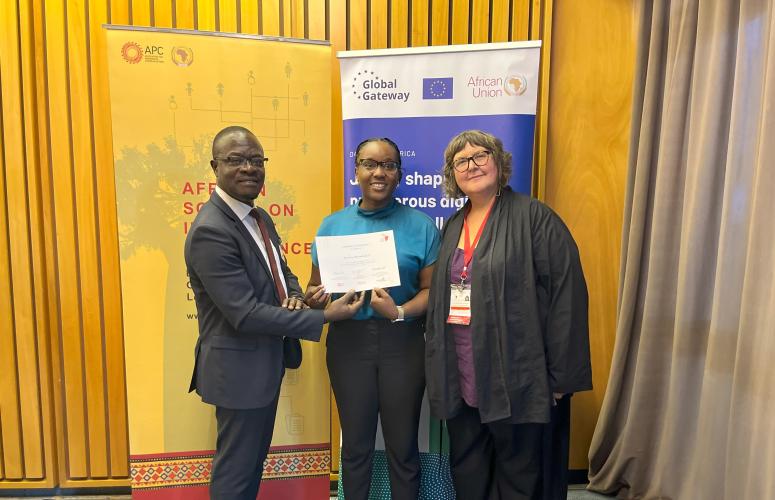
In the cool embrace of November, Addis Ababa, Ethiopia, played host to the 12th African School on Internet Governance (AfriSIG24) from 14 to 19 November 2024. Against the city's unique high altitude and cultural richness, AfriSIG24 brought together passionate voices from across the continent, offering a transformative platform for dialogue, learning and collaboration on Africa’s digital future. Organised by the Association for Progressive Communications (APC), this prestigious initiative highlighted the urgent need for inclusive, rights-respecting governance in the digital age while empowering a new generation of leaders to tackle these challenges head-on.
AfriSIG24’s curriculum was a masterstroke of design, offering participants a holistic exploration of internet governance. It moved seamlessly from foundational knowledge to advanced discussions on cutting-edge topics such as artificial intelligence (AI), cybersecurity and digital trade. Attendees, drawn from governments, civil society, academia and the private sector, enriched the experience with their diverse perspectives, fostering a vibrant and dynamic learning environment. A particular highlight was the Parliamentary Track Practicum, where participants collaborated with parliamentarians from Cameroon, Lesotho, Nigeria, Sierra Leone and Zimbabwe to develop critical policy submissions addressing key regional priorities. These included harmonising digital policies to unlock the potential of the African Continental Free Trade Area (AfCFTA), addressing fragmented regulations on data privacy and cross-border data flows, championing gender inclusivity and equitable digital rights frameworks, and aligning the AfCFTA Protocol on Digital Trade with the African Union’s Digital Transformation Strategy.
The practicum offered a hands-on opportunity to engage in real-world policy making, showcasing the importance of bridging theoretical knowledge with practical application. For participants, it was an invaluable experience that underscored the interconnectedness of digital rights, economic development and governance in Africa, with practical exercises whose lessons will remain with us forever.
Being selected for AfriSIG is not just an accolade, it is a transformative opportunity to be part of a growing movement shaping Africa’s digital governance. You gain unparalleled insights from a syllabus designed by leading experts, network with a multistakeholder community of policy makers, academics, activists and private sector leaders, and actively contribute to shaping policy outcomes on critical issues like AI, cybersecurity and digital trade. Moreover, the programme equips attendees with the tools to influence local, regional and global internet governance processes, making them invaluable assets in their respective sectors.
The discussions at AfriSIG24 illuminated the critical role of harmonised, inclusive digital policies in advancing Africa’s transformation. Key insights included the urgent need for comprehensive data governance frameworks that balance cross-border data flows with the protection of digital rights, the importance of inclusive strategies to bridge disparities in infrastructure and digital skills, and the necessity of multistakeholder collaboration to address challenges like internet fragmentation, cybersecurity and emerging technologies. These lessons reinforced the shared responsibility of all stakeholders in creating an equitable, innovative and rights-respecting digital ecosystem for the continent.
The momentum from AfriSIG24 carried forward into the Africa Internet Governance Forum (AfIGF), held from 20 to 22 November 2024. The AfIGF extended discussions initiated at AfriSIG, focusing on expanding connectivity for underserved communities, ensuring digital inclusion for persons with disabilities, and addressing the governance of emerging issues such as AI, climate change and digital sovereignty. These forums underscored the importance of leveraging shared knowledge and regional collaboration to address Africa’s most pressing digital governance challenges.
As we prepare to draw on the insights from AfriSIG24 and the AfIGF to contribute to shaping the upcoming 19th annual meeting of the global IGF, to be hosted in a hybrid format from 15 to 19 December in Riyadh, Kingdom of Saudi Arabia, several key recommendations emerge. These include harmonising regional digital policies with global governance standards, promoting gender-responsive strategies to ensure equitable participation in digital governance, strengthening multistakeholder collaborations to tackle cybersecurity and AI-related challenges, and advancing data governance frameworks that balance economic aspirations with the protection of digital rights. Moreover, there is an urgent need to address digital sovereignty by fostering localised yet interoperable systems that support equitable development across Africa.
AfriSIG24 was more than an event. It was a call to action, a testament to the power of collaboration, and a reminder of the collective responsibility to shape a digital future that leaves no one behind. For those fortunate enough to be part of this programme, it is a transformative experience, offering a unique opportunity to engage with Africa’s most critical digital governance issues while building lifelong networks and skills. As Africa continues its journey toward digital transformation, initiatives like AfriSIG remain pivotal, empowering a generation of leaders committed to equity, innovation, and the protection of fundamental rights.
For anyone passionate about driving Africa’s digital future, being selected for AfriSIG is an unparalleled opportunity to learn, contribute and lead. It’s more than a programme, it’s a movement shaping the future of internet governance on the continent.
Patricia Ainembabazi is a project officer at the Collaboration on International ICT Policy for East and Southern Africa (CIPESA), with over eight years of experience in advancing digital rights, internet governance and civil society engagement across Africa. Her work empowers communities through digital security training, advocating for inclusive policies and supporting initiatives on freedom of expression. She is passionate about fostering innovation and data-driven advocacy in the African digital rights landscape.
